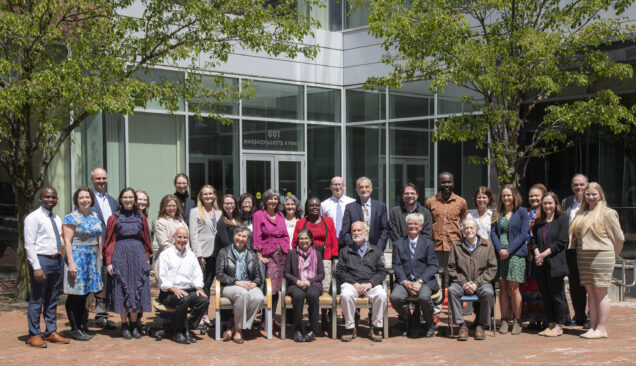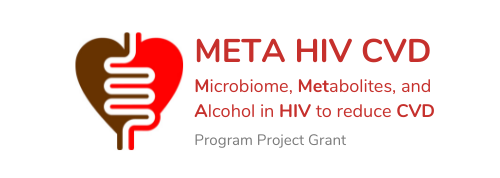Newsletter
Volume 10, Issue 3
July – September 2023
Check out the current issue of URBAN ARCH News, the quarterly newsletter bringing you news on the latest URBAN ARCH and related research.
The GRAIL Study
In this edition of the URBAN ARCH Newsletter, we highlight the recently funded Gabapentin to Reduce Alcohol and Improve Viral Load Suppression (GRAIL) study.
Click on the buttons below to see what the International URBAN ARCH Center Cores and Projects have been working on.
Spotlight on… Allen Kekibiina
 In this issue, we interview GRAIL field coordinator Allen Kekibiina about her background in the field of HIV and alcohol research, and her current work on the GRAIL study.
In this issue, we interview GRAIL field coordinator Allen Kekibiina about her background in the field of HIV and alcohol research, and her current work on the GRAIL study.
Article Spotlight
Alcohol Use Did Not Increase Risk for Serious Isoniazid-related Toxicity Among People With HIV and TB
Among people with HIV (PWH), isoniazid preventative therapy can help prevent tuberculosis (TB) disease. However, isoniazid therapy is not recommended for people with heavy alcohol use, due to concerns about hepatotoxicity. URBAN ARCH researchers in Uganda investigated the incidence of severe isoniazid-related toxicity among a cohort of PWH, some of whom had consumed alcohol within the last 3 months (n=200), and some of whom had no alcohol consumption in the last year (n=101). All participants were receiving antiretroviral therapy, had TB infection, and had alanine aminotransferase (ALT) and aspartate aminotransferase (AST) 2× or less the upper limit of normal (ULN). Isoniazid-related toxicity was classified thus: Grade 3+ (ALT or AST at least 5× the ULN or severe symptoms), or Grade 2 (ALT or AST 2-5× the ULN or moderate symptoms).
- Overall, 8.3 percent (95% confidence interval [95% CI] 5.4–12.0) of the cohort had Grade 3+ isoniazid-related toxicity. Of participants with alcohol use, the incidence was 6 percent (95% CI 3.1–10.2); among those without alcohol use, the incidence was 12.9 percent (95% CI 7.0–21.0).
- Overall, 21.7 percent (95% CI 17.0–27.1) of the cohort had Grade 2 isoniazid-related toxicity. Of participants with alcohol use, the incidence was 25 percent (95% CI 19.0–31.8); among those without alcohol use, the incidence was 14.8 percent (95% CI 8.1–23.9).
Comments: Alcohol use did not increase the risk of serious isoniazid-related toxicity in this cohort of PWH who did not have significant liver enzyme elevations at baseline. These results suggest that alcohol use should not preclude receipt of isoniazid therapy to prevent TB disease among PWH who drink.
Reference: Hahn JA, Ngabirano C, Fatch R, et al. Safety and tolerability of isoniazid preventive therapy for tuberculosis for persons with HIV with and without alcohol use. AIDS. 2023;37(10):1535-1543.
Save the Date: 2024 URBAN ARCH Annual Meeting
Mark your calendars! The 2024 URBAN ARCH Annual Meeting will be held on May 3, 2024, with options to attend virtually via Zoom or in-person in Boston. Additional details will be announced soon. We look forward to seeing you there!

URBAN ARCH invites poster abstract submissions from trainees and early stage investigators for the 2024 URBAN ARCH Annual Meeting. Abstract submissions should focus on alcohol/HIV research. Research previously presented or submitted to other conferences is welcome.
Three abstracts will be selected for 10-minute oral poster presentations, which can take place in-person or via zoom.
If you are interested, please submit your abstracts here by Monday, February 26, 2024. Please reach out to Natalia Gnatienko with any questions.
New URBAN ARCH Publications
- Hahn JA, Ngabirano C, Fatch R, Emenyonu NI, Cheng DM, Adong J, Tumwegamire A, Terrault NA, Linas BP, Jacobson KR, Muyindike WR. Safety and tolerability of isoniazid preventive therapy for tuberculosis for persons with HIV with and without alcohol use. AIDS. 2023 Aug 1;37(10):1535-1543. Epub 2023 May 29. PMCID: PMC10355800.
- Raj A, Gnatienko N, Cheng DM, Blokhina E, Dey AK, Wagman JA, Toussova O, Truong V, Rateau L, Lunze K, Krupitsky E, Samet JH. Provider-patient experiences and HIV care utilization among people living with HIV who inject drugs in St. Petersburg, Russia. Int J Qual Health Care. 2023 Aug 29:mzad068. Epub ahead of print.
- Samet JH, Blokhina E, Cheng DM, Rosen S, Lioznov D, Lunze K, Truong V, Gnatienko N, Quinn E, Bushara N, Raj A, Krupitsky E. Rapid access to antiretroviral therapy, receipt of naltrexone, and strengths-based case management versus standard of care for HIV viral load suppression in people with HIV who inject drugs in Russia (LINC-II): an open-label, randomised controlled trial. Lancet HIV. 2023 Sep;10(9):e578-e587.
Events and Conferences
- Conference on Retroviruses and Opportunistic Infections (CROI): March 3-6, 2024; Denver, CO, USA.
- International Workshop on HIV and Hepatitis Observational Databases: March 21-23, 2024; Vilamoura, Portugal.
- American Society of Addiction Medicine Conference (ASAM): April 4-7, 2024; Dallas, TX, USA
Upcoming abstract submission deadlines: CROI (September 27, 2023); CPDD (December 29, 2023); RSA (Early January, Date TBA).
Click here for more events and conferences.



